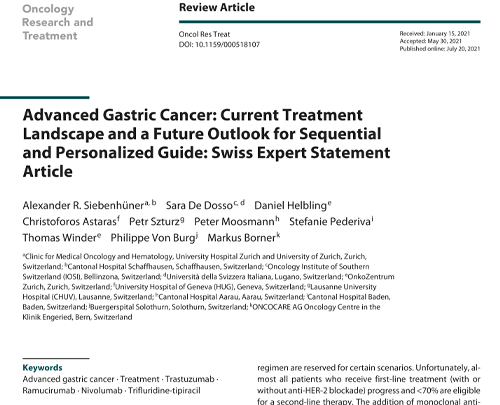
Advanced Gastric Cancer: Current Treatment Landscape and a Future Outlook for Sequential and Personalized Guide: Swiss Expert Statement Article
Keywords
Advanced gastric cancer · Treatment · Trastuzumab ·
Ramucirumab · Nivolumab · Trifluridine-tipiracil
Abstract
Background: Gastric cancer is a leading cause of cancer-related deaths worldwide. Several treatment possibilities have been investigated, but only a few show clinically meaningful results. Summary: Systemic treatment options for advanced gastric cancer (aGC) have evolved over the recent years, implementing the growing molecular knowledge of this heterogeneous disease. Molecular profiling (at least for HER-2-expression, microsatellite instability status, Epstein-Barr virus expression, and programmed death ligand-1 expression/ combined positive score [CPS]) is recommended for all therapy-fit patients prior to the start of a systemic treatment and is crucial for decisions on treatment strategy and drug selection.
Various examples like the application of trastuzumab in the HER-2-positive subgroup underline the benefits of this approach starting from the first-line setting. A combination of platinum and fluoropyrimidine remains the first-line chemotherapy backbone in the treatment of advanced gastric cancer. Triplet combinations adding taxanes to the doublet regimen are reserved for certain scenarios. Unfortunately, almost all patients who receive first-line treatment (with or without anti-HER-2 lockade) progress and <70% are eligible for a second-line therapy. The addition of monoclonal antibodies has substantially improved outcomes in this setting.
As such, ramucirumab has led to significant and clinically meaningful advancements in the second-line treatment. Furthermore, immuno-oncology with checkpoint inhibition and immune stimulation has evolved in the field of aGC. Recent first-line data show a significant survival benefit in aGC patients with a CPS ≥ 5 under immunochemotherapy. Nonetheless, the impact of immunotherapy combinations and immunochemotherapy remains an area of investigation. Key Message: In this review, we highlight recent improvements in the treatment landscape of advanced gastric cancer, the heterogeneity of this disease, and possible personalized targets.
© 2021 The Author(s)
Published by S. Karger AG, Basel
